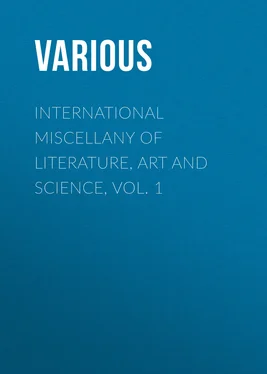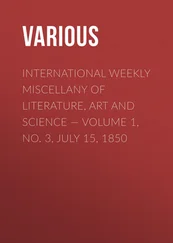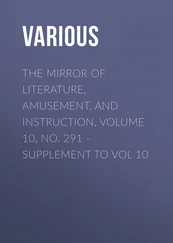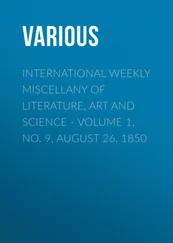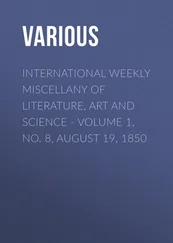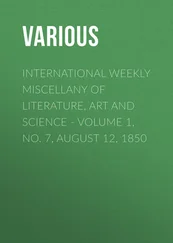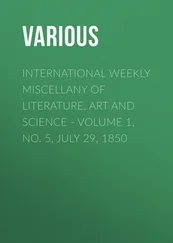Various - International Miscellany of Literature, Art and Science, Vol. 1
Здесь есть возможность читать онлайн «Various - International Miscellany of Literature, Art and Science, Vol. 1» — ознакомительный отрывок электронной книги совершенно бесплатно, а после прочтения отрывка купить полную версию. В некоторых случаях можно слушать аудио, скачать через торрент в формате fb2 и присутствует краткое содержание. Жанр: foreign_antique, periodic, foreign_edu, на английском языке. Описание произведения, (предисловие) а так же отзывы посетителей доступны на портале библиотеки ЛибКат.
- Название:International Miscellany of Literature, Art and Science, Vol. 1
- Автор:
- Жанр:
- Год:неизвестен
- ISBN:нет данных
- Рейтинг книги:3 / 5. Голосов: 1
-
Избранное:Добавить в избранное
- Отзывы:
-
Ваша оценка:
- 60
- 1
- 2
- 3
- 4
- 5
International Miscellany of Literature, Art and Science, Vol. 1: краткое содержание, описание и аннотация
Предлагаем к чтению аннотацию, описание, краткое содержание или предисловие (зависит от того, что написал сам автор книги «International Miscellany of Literature, Art and Science, Vol. 1»). Если вы не нашли необходимую информацию о книге — напишите в комментариях, мы постараемся отыскать её.
International Miscellany of Literature, Art and Science, Vol. 1 — читать онлайн ознакомительный отрывок
Ниже представлен текст книги, разбитый по страницам. Система сохранения места последней прочитанной страницы, позволяет с удобством читать онлайн бесплатно книгу «International Miscellany of Literature, Art and Science, Vol. 1», без необходимости каждый раз заново искать на чём Вы остановились. Поставьте закладку, и сможете в любой момент перейти на страницу, на которой закончили чтение.
Интервал:
Закладка:
Sir David Brewster has edited and written various works, besides contributing largely to the Edinburgh Review , the Transactions of the British Association , and other scientific societies, and the North British Review . Among his more popular works are "A Treatise on the Kaleidoscope;" an original Treatise on Optics for the Cabinet Cyclopaedia; and Letters on Natural Magic and a Life of Sir Isaac Newton for the "Family Library." The latter work has been translated into German.
Sir David Brewster is likewise one of the editors of the London and Edinburgh Philosophical Magazine .
The discoveries of Sir David Brewster range from the kaleidoscope to the law of the angle of polarization, the physical laws of metallic reflection, and the optical properties of crystals; and the venerable philosopher is the author of an immense number of facts and practical applications in every branch of optics.
The AMERICAN SCIENTIFIC ASSOCIATION assembled this year at New Haven, and Was presided over by Alex. D. Bache, LL. D. of the Coast Survey. It was attended by many of the most eminent men of science in this country, among whom were President Woolsey, Professor Denison Olmsted, the elder and the younger Silliman, E. C. Herrick, and E. Loomis, of Yale College; Professors Louis Agassiz, E. N. Hosford and Benjamin Pierce of Harvard University; Lieutenant Charles H. Davis, U. S. N.; Professor O. M. Mitchell, Superintendent of the Cincinnati Observatory; Dr. A. L. Elwyn of Philadelphia; Professor Walter R. Johnson of Washington; Professor Joseph Henry, Secretary of the Smithsonian Institution; William C. Redfield of New York; and an unusual number of amateur scholars from various parts of the Union. There were several papers of remarkable value, among which that of Mr. Squier, our Charge d'Affaires for Central America, was perhaps at this period of the most general interest. Others were puerile, and as unfit in subject as in ability for presentation in such an assembly. It is to be regretted that the Association does not adopt the only protection against such discreditable annoyances, by insisting upon the submission of everything offered for its consideration to a competent private committee.
A GREAT NATIONAL SOCIETY FOR THE ADVANCEMENT OF LEARNING, is said to have been discussed recently at the meetings of inferior societies, and we have read a circular upon the subject, which contemplates a convention of scholars and men of letters, at Washington, some time in the coming winter. The American Philosophical Society, founded by Franklin, and made respectable by the labors of many eminent men, is no longer in authority, and its proceedings command little attention. The various societies for the cultivation of the natural sciences, in Philadelphia, Boston, and New York, are undoubtedly accomplishing much good, but the spheres and degrees of their influence would be greatly enlarged under a central organization. In such a design, the initiative should be taken by men of nerve as well as men of abilities, so that the dead weights of mediocrity so constantly obtruding into and making ridiculous the present societies, should be altogether excluded.
Hitherto, in this city, the most reputable and dignified association connected with the advancement of learning, has been the Ethnological Society. It is to be feared that with the death of Mr. Gallatin, its president, and the dispersion of so many of its active members in the diplomatic service, its action hereafter will deserve less consideration than has thus far been awarded to it.
LAMARTINE'S APOLOGY FOR HIS CONFIDENCES
Lamartine has just commenced the publication of a second part of his Confidences, in the feuilleton of La Presse , and precedes it by the following letter to the editor of that paper, which we translate for The International from La Presse of July 30. It relates to the way in which he came to publish the work, and gives a deeply interesting account of the pecuniary embarrassments under which he had for some time been laboring, and then eloquently defends the publication of what is real, and glowing in private life and experience.
To M. de Girardin:
In addressing to you, my dear Girardin, this third volume of private notes, to which the public have given the name of Confidences , I cannot repress an emotion of pain. What I foresaw but too well has happened. I have opened my life, and it has evaporated. This journal of my impressions has found grace, indulgence, interest even, with some readers, if I may judge from the anonymous friends who have written me. But the unsparing critics, men who mingle even our tears with their ink, in order to give more bitterness to their sarcasms, have not pardoned those outbursts of a soul of twenty. They have believed, or have pretended to believe, that I was seeking a miserable celebrity in the ashes of my own heart: they have said, that by an anticipation of vanity, I desired to gather and enjoy in advance, while yet living, the sad Flowers which might one day grow after me upon my tomb. They have cried out at the profanation of the inner feeling; at the effrontery of a soul shown naked; at the scandal of recollections made public; at the venality of sacred things; at the simony of the poet selling his own fibers to save the roof and the tree that overshadowed his cradle. I have read and heard in silence all their malign interpretations of an act, the true nature of which had been revealed to you long before it was to the public. I have answered nothing. What could I say? The appearances were against me. You alone knew that these notes had long existed, shut up in my casket of rosewood, along with the ten volumes of the notes of my mother; that they were intended never to be taken thence; that I rejected the first suggestion of publishing them, with all possible warmth of resolution; that I refused the ransom of a king for those leaves of no real value; and that finally, one day—a day for which I reproach myself-constrained fatally to choose between the necessity of selling my poor Charmettes — Charmettes , as dear and more holy than the Charmettes of the Confessions —and the necessity of publishing these pages, I preferred myself to suffer rather than cause suffering to good old servants, by selling their roofs and their vines to strangers. With one hand I received the price of the Confidences , and with the other I gave it to others in order to purchase time.
Behold here all the crime that I am expiating.
And let the critics rejoice till their vengeance is satiated. This sacrifice was in vain. It is in vain that I have cast upon the wind these leaves, torn from the book of my most pious memories. The time that their price procured has not proved sufficient to conduct me to the threshold of that abode where we cease to regret anything. My Charmettes have been sold. Let them be content. I have had the shame of publishing these Confidences , but not the joy of having saved my garden. Steps of strangers will efface there the steps of my father and mother. God is God, and sometimes he commands the wind to uproot the oak of a hundred years, and man to uproot his own heart. The oak and the heart are his, we must yield them to him, and yield him therewith justice, glory, and benedictions!
And now that my acceptance of these critics is complete, and that I confess myself guilty, and still more, afflicted—am I as guilty as they say, and is there no excuse, which, in the eyes of indulgent and impartial readers, can extenuate my crime?
In order to judge as to this, I have but one question to ask you, and the public, which deigns with distracted finger to turn these pages. My question is this:
Читать дальшеИнтервал:
Закладка:
Похожие книги на «International Miscellany of Literature, Art and Science, Vol. 1»
Представляем Вашему вниманию похожие книги на «International Miscellany of Literature, Art and Science, Vol. 1» списком для выбора. Мы отобрали схожую по названию и смыслу литературу в надежде предоставить читателям больше вариантов отыскать новые, интересные, ещё непрочитанные произведения.
Обсуждение, отзывы о книге «International Miscellany of Literature, Art and Science, Vol. 1» и просто собственные мнения читателей. Оставьте ваши комментарии, напишите, что Вы думаете о произведении, его смысле или главных героях. Укажите что конкретно понравилось, а что нет, и почему Вы так считаете.
